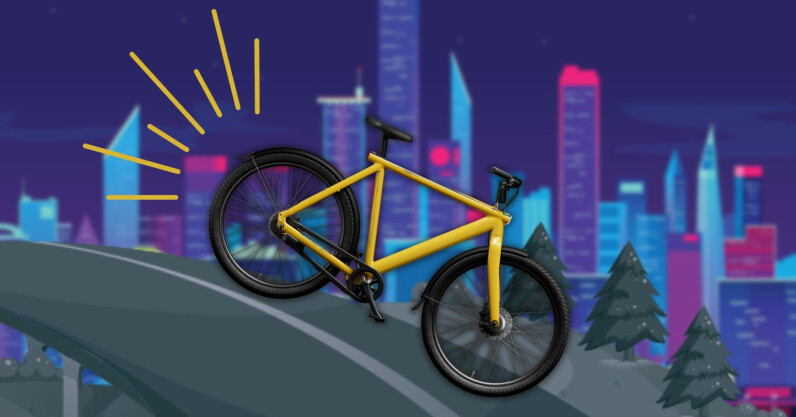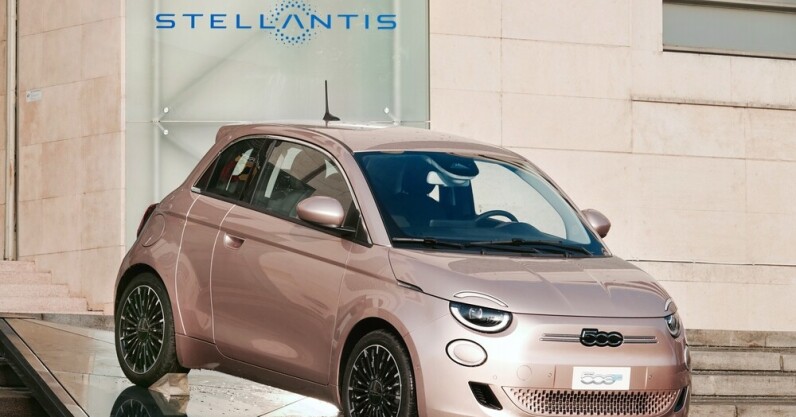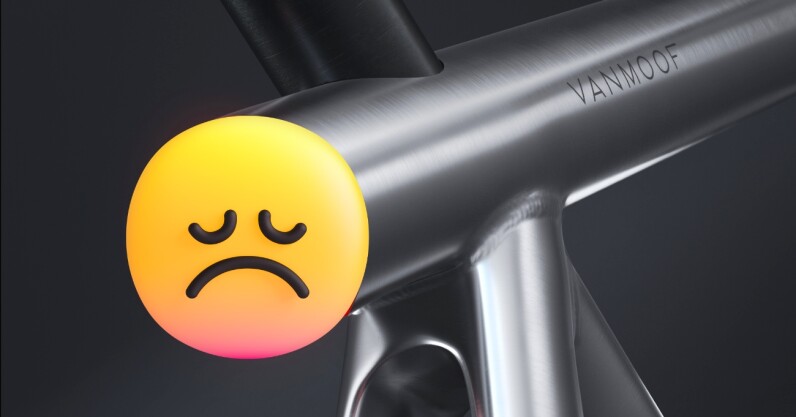VanMoof: What startups can learn from the rise and fall of an ebike superstar
Since launching in 2009, VanMoof, known for its sleek, high-tech city bikes, developed an almost cult-like following — from the streets of Amsterdam to New York.
Today, what was once the world’s most-funded ebike startup is bankrupt, leaving riders angry, loyal followers depressed, and the industry wondering — what’s next?
Pretty much everyone and their dog has an opinion on the matter. But we wanted to hear from those closest to the action and perhaps the most affected in the long term: ebike startups.
“The VanMoof story deserved a better ending,” says Tanguy Goretti, founder of Belgian ebike company Cowboy, perhaps VanMoof’s closest competitor. “They helped change the face of the industry, the world’s perception of ebikes, and had a truly positive impact on cities.”
What went wrong?

The <3 of EU tech
The latest rumblings from the EU tech scene, a story from our wise ol’ founder Boris, and some questionable AI art. It’s free, every week, in your inbox. Sign up now!
Startups and industry experts from far and wide opened up to TNW to share their thoughts. There were a few golden threads that emerged through all the responses, namely: VanMoof grew too quickly, its bikes relied too heavily on high-tech customised parts, and its after-sales service model was unmanageable. Given the current economic climate, it was doomed to fail, chimed some of the respondents.
Bastian Dietz of the Cycling Innovation Accelerator says he saw it coming. “Once VanMoof’s 2021 figures were published, it was very clear that their business model wasn’t going to last.” VanMoof suffered a loss of almost €80mn in 2021, €78mn in 2022, and has never made a profit.
“Their burn rate was off the charts because they tried to do everything themselves,” says industry expert Augustin Friedel, in reference to VanMoof’s end-to-end business model which sought to design, manufacture, sell, and service its expensive ebikes in-house. “They bit off more than they could chew,” he adds.

What made VanMoof bikes so appealing — their sleek design, kitted out with customised features like a kicklock, built-in alarm, and in-app functionality — may have been their achilles heel.
The bikes were unreliable, and when riders wanted to get them repaired they had no choice but to rely on VanMoof’s own service. “Even something as simple as straightening a wheel could not be done at a normal bike store,” said one frustrated rider.
Existing customers reported waiting weeks for their bikes to get basic repairs, while new ones were sometimes left waiting six months or more for their new set of wheels. Overall, VanMoof customers were becoming increasingly dissatisfied with the product and the service.
Over the past year or so, VanMoof’s apparently unsustainable business model came up against another obstacle: the global economic downturn and the bursting of the post-pandemic bicycle boom.
“There is no doubt that the past couple of years have been challenging for the sector overall,” said Cowboy’s Goretti, who hopes his brand, which builds bikes not unlike VanMoof’s, will reach profitability next year.
James Walker, CEO and founder of UK-based Jorvik, Europe’s biggest manufacturer of e-tricycles, said VanMoof’s woes were a testament to the impact of the cost of living crisis on fledgling businesses.
“If you consider a rise in all outgoings — from import fees, maintenance, tax, and salaries — all these things add up,” he says. “If they mount to a point of pushing a business into the red, there’s no going back.”
In lean times, most businesses try to consolidate their existing markets. VanMoof did the opposite. It continued opening up new stores across the world, onboarding staff, and kept on borrowing more money to keep the whole ship afloat.
“One of the biggest challenges in our industry is to make sure we have quality over quantity and that we are able to service the bikes. If you grow too big too fast, then very often, that’s not the case anymore,” says Tuuli Jevstignejev, CMO at Estonian company Ampler Bikes.
What can the industry learn?
While the ebike world is still reeling from the loss of its posterchild startup, the downfall of VanMoof serves as a lesson for other early-stage companies looking to make their mark in the sector.
“New and existing brands should avoid unnecessary complexity in their bikes, design them so customers can make use of existing servicing infrastructure, and make sure they can operate without proprietary parts,” German ebike startup Lemmo told TNW.
While most ebikes cannot be used manually without considerable effort, Lemmo designed theirs to be ridden both as a traditional bike and an ebike. The digital components are located outside the frame in a removable single pack which includes the battery. “The bike can be serviced anywhere and is ridable all the time,” said the startup.
Ampler’s Jevstignejev also favours simplicity: “You should be able to switch your handlebars or pedals if you don’t like the ones you get, you should be able to continue cycling if your battery dies, and you should be able to get a quick fix for your bike from that bike shop down the street that’s been there for 40+ years.”
Jevstignejev says she would rather focus on bettering existing products and taking care of the after-market than “launching a new shiny gadget yearly.”


One of the biggest worries for VanMoof riders now is that their ebikes will become obsolete without regular software patches and updates. For now, Cowboy has developed an app to keep VanMoofers on the road.
“But relying on a competitor to step in is not scalable,” says William Godfrey, founder at UK-based startup Twist. “There are still many unanswered questions on how Vanmoof’s insurance or servicing operations will carry on.”
Twist helps hardware companies develop an ‘end of life protocol’ so that their products can live on even if the company itself should fail. Its customers include the likes of Swedish electric dirt bike maker CAKE.
“Hardware products are increasingly dependent on software, causing more waste and leaving stakeholders unable to pick up the pieces,” he tells TNW, pointing to the heaps of e-scooters or shared bicycles piling up across the world because manufacturers did not “design for the end in mind.”
According to Godrey, banks are increasingly scrutinising the circularity of a product before underwriting loans, too.
On the sales side of things, startups would do well to pivot away from a purely D2C approach, like VanMoof, and toward multi or even omnichannel sales, says Dietz of the Cycling Innovation Accelerator.
Cowboy, for one, told TNW it is moving away from pure D2C and now has wholesalers, and subscription models, and is set to work with 300 independent bike shops to sell and service its bikes by the end of the year.
Dietz also advises sticking with industry standards for non-electrical components like Bosch, Shimano, Mahle, and Bafang, to the greatest extent possible.
This not only improves the aftersales experience but also cuts costs for ebike startups, whose proprietary parts can make their bikes loss-making by design, as was the case with VanMoof.
What happens now?
In 2022, the European market for ebikes reached a record 5.5 million units sold, representing an annual growth of 8.6%. One in every four bikes sold in Europe last year was electric.
While demand is not showing any signs of slowing down, investor appetite might. Across the VC landscape capital funding in Europe is plummeting as investors shift focus from growth to cost-cutting.
“On the investors’ side, the hey-days of ebikes have been over for a while already,” says Dietz, who believes VanMoof’s bankruptcy won’t affect the mobility ecosystem whatsoever.
Friedel is not as optimistic, and believes VanMoof’s fall from fame could have an impact on access to funding for other ebike startups.
Lemmo agrees. “This will make all investors scrutinise more in detail not only the ebike industry but probably the entire micromobility sector, from supply chains to customer journeys and product design,” the company says.
Even though the impacts will be hard to measure, VanMoof has sent a clear message to the ebike startup ecosystem — keep it simple, stupid.
Build bikes that work (even if that means building simpler), outsource parts and servicing to trusted partners, design with the end in mind, and whatever you do, do not forget about your after-market. And if this means you sacrifice on growth, so be it, at least your business will be sustainable.
Ebikes are so popular because they offer a quick, accessible, sustainable mode of transport. But let’s not over complicate them and risk taking away the simplicity that made the bicycle such a rock-solid technology in the first place.
VanMoof: What startups can learn from the rise and fall of an ebike superstar Read More »
















